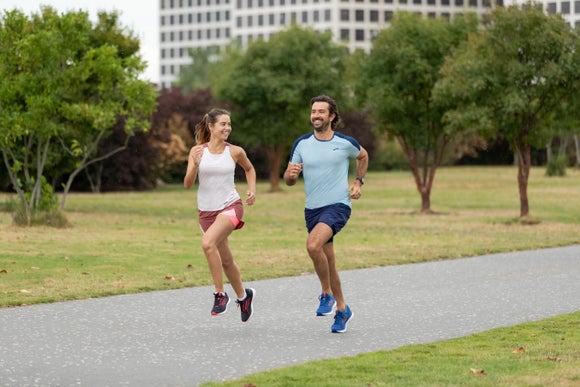How Running Benefits Your Health
Updated: 12 September 2024

Whether we are sitting behind our desks all day glued to our screens or stuck in our cars on long commutes, our modern world of technology has contributed to an increase in the sedentary lifestyle, which is detrimental to overall health and well-being. It is recommended that adults should be getting at least 150 minutes (2.5 hours) per week of moderate-intensity aerobic exercise or a combination of 75 minutes of high-intensity cardio workouts weekly. For 6 to 17-year-olds, the guidelines are 60 minutes per day of moderate to high-intensity physical activity. Unfortunately, only one in five adults and teens are meeting these exercise guidelines. It's time to get moving!
Running is one of the best forms of exercise to improve your overall health at any age. From lifting your mood to boosting your memory to keeping your heart healthy, the emotional, mental, and physical health benefits extend way beyond simply staying in shape. Read on to discover some of the countless health perks of running and the remarkable effects on your mind, body, and spirit. It just might encourage you to lace up next time you are struggling to find motivation.
Emotional Health

We have all heard about the ubiquitous "runner's high," or the feeling of euphoria after a run. Well, we can thank our bodies for producing those feel-good chemicals. Intense exercise like running boosts the body's production of natural chemicals such as endorphins, which reduce stress and pain, and increase feelings of pleasure that contribute to the elated runner's high experience. Running also helps the body create more serotonin and dopamine, chemicals that combat depression and anxiety to lift your mood and improve your overall outlook on life. Your self-esteem and confidence also get a boost, because as you adopt a healthy lifestyle and maintain active fitness, you start to feel better when you see tangible results and successes. Whether it's breaking PRs, getting in shape, or completing a marathon, the journey of setting and accomplishing goals carries over to other areas of your life. The next time you face a challenge, you can take it on with confidence by recalling how you persevered after hitting a wall or bouncing back from an injury.
Running is also an opportunity for much-needed personal, self-care time. It's where you can clock out from the daily to-do list and practice a balanced life—making time for yourself by filling up your own cup before pouring into the lives of others and avoiding emotional burnout. It can be a therapeutic experience, where the simple repetitive motion can help you process emotions and take a break from life's demands. So whenever you're feeling blue, just lace up and hit the road; it is bound to lift your spirits.
Mental Health

Whether getting a head start in the morning or after a long workday, ticking off some miles is a great way to relax your mind and relieve stress. Since running is alone time for your brain, it offers the ideal setting for a peaceful, contemplative state where you can tune out the stressors of the world, be present in the moment, and burn off any negative energy and thoughts troubling your mind. This is especially true on outdoor runs; when you're surrounded by nature and getting your dose of vitamin D, you can think more clearly, hear your inner voice, reduce brain fog, and gain mental clarity. It's also the optimum time for meditation, allowing you to focus on your breathing, improve self-awareness, and alleviate tension. As a result, your creative juices start flowing, and you can come up with new ideas or solutions for a project and gain insight into a decision you have to make.
Not only can you practice mindfulness by running, but you can maintain a sharp mind as well. Studies have shown that running regularly enhances brain function and reduces cognitive decline such as Alzheimer's and dementia in old age. This is because consistent exercise causes changes to the hippocampus, improving your learning and memory skills. Running also improves your heart rate and blood flow, allowing oxygen-rich blood to be pushed to the brain and contribute to the growth of new nerve cells and blood vessels for overall better neurological functioning.
Physical Health

While running produces visible physical health benefits, such as better body composition, managing a healthy weight, and staying fit, there are also internal physical rewards that have long-lasting effects as we age. Research shows that a moderate amount of exercise lowers inflammation, reducing the risk of developing certain types of cancers and diseases. Running also contributes to a stronger immune system, helping to decrease the risk of contracting infections, bacteria, and viruses. Additionally, running promotes healthy hormone regulation, lowers LDL cholesterol, improves glucose levels, and regulates insulin control, which reduces the risk of developing diabetes later in life. Running is also one of the best heart-healthy exercises you can engage in. When you pick up the pace, your heart rate increases, allowing blood to circulate to your muscles for a more rapid flow of vital oxygen and nutrients. As a result, your blood pressure lowers, your HDL cholesterol improves, along with your blood sugar levels, reducing the chances of experiencing cardiovascular disease, heart attack, or stroke.
A healthy body also translates to healthy eyes. Many long-term studies have concluded that your vision benefits from running by lowering the risk of developing glaucoma, macular degeneration, and cataracts. Exercise decreases the internal pressure in the eyes, which causes glaucoma and other eye diseases that can lead to blindness, and increases antioxidant enzymes to protect against cataracts. And, contrary to popular belief, research shows that running can strengthen your knees and joints, helping to increase bone mass and prevent age-related bone loss. The risk of developing osteoporosis or arthritis decreases because you are building more muscle strength and stronger bones. In addition, running helps you get a better night's rest by improving the quality and duration of your sleep. Lastly, it enhances your overall vitality, not just adding more years to your life but quality years.
Summary
From the top of your head to the soles of your feet, the health benefits of running are innumerable. For those just starting on their running journey, it's important to gradually ease into a routine as you build endurance and strength. Avoid overtraining to minimise the risk of injury, and always consult a physician before starting a new exercise program. Overall, investing time in your health and adopting an active lifestyle now will pay off future dividends in the long run. So the next time you don't feel like going for a run, conquer the mental battle, lace up your running shoes, and head out the door—your mind, body, and spirit will thank you, both now and for many years to come.




